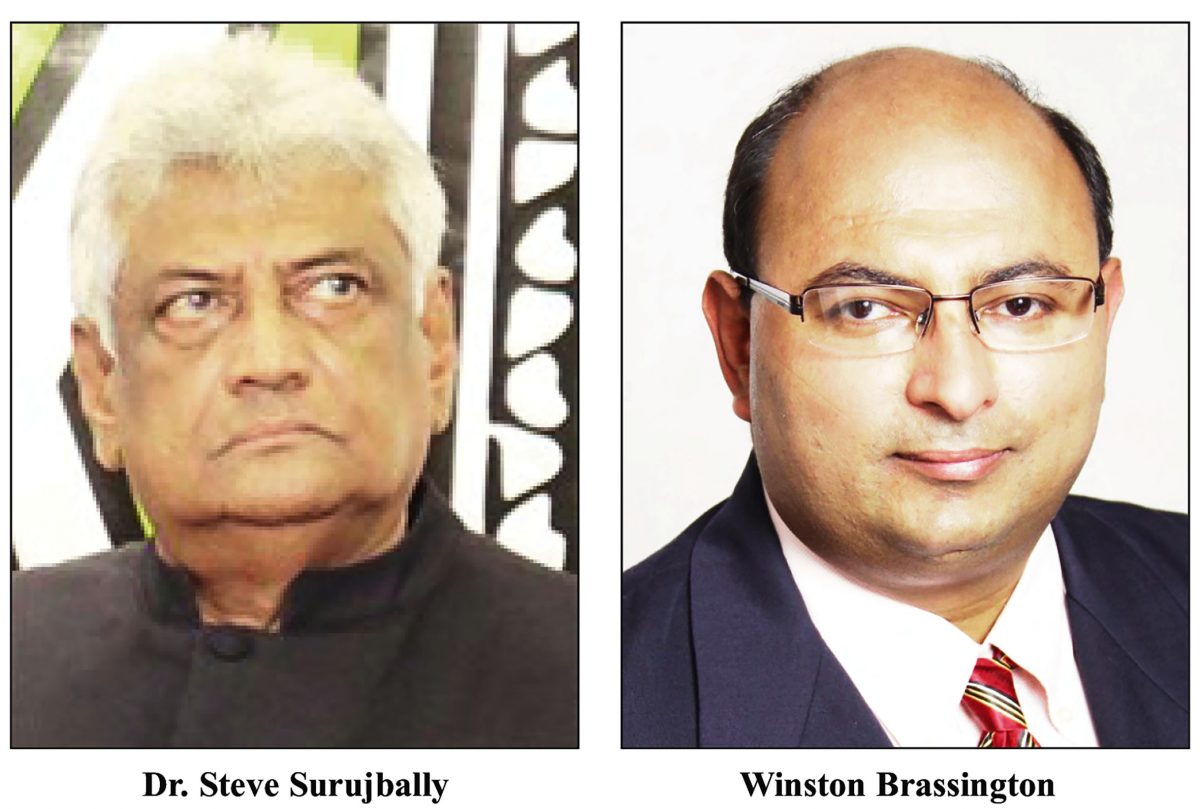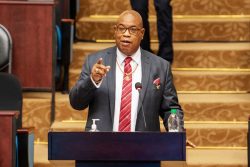In defence to the $100m lawsuit filed against it by veterinarian Dr. Steve Surujbally, who is seeking adequate compensation for the compulsory acquisition of his land through which the gas to shore project will run, government describes its action as necessary.
It says that of the 2.005 acres owned by Surujbally, it is only approximately 1.5 acres that was acquired by government and so the sum he is asking for is “unreasonable,” as that portion is valued at only $7.6m.
The defending affidavit of head of the Project Task Force, Winston Brassington, deposes that part of government’s responsibility under the project is the acquisition of lands pursuant to the Acquisition of Lands for Public Purposes Act.
On behalf of the Attorney General and Minister of Public Works who are the listed Respondents in the action, Brassington in his defending affidavit underscored that the Applicant’s land is among those which run along the route of the pipeline.
His position is that pursuant to the Act, government has had to compulsorily acquire the lands to facilitate the gas to shore (GTS) project; noting that it aims at national transformation to lower electricity and energy costs.
He also argued that those reductions will in turn “enable the expansion of the manufacturing and industrial sectors, promote economic diversification, and reduce the overall cost of living.”
Brassington further deposes in his affidavit that the project “is expected to generate 300 MW of electricity, with the primary objective of providing low-cost reliable electricity to the public, with generation costs of electricity expected to be less than half the current costs derived from imported heavy fuel oil.”
Surujbally’s position, however, is that he is not opposed to the project; but his clear demand is that he ought to be compensated for his land.
His contention is that he is being deprived his property, which violates his guaranteed constitutional right and is therefore asking the Court that he be adequately compensated by the government.
Surujbally is asking the High Court to declare that the State’s failure in making “prompt payment of adequate compensation” for the acquisition of his land is unlawful.
The State’s argument, however, is that Surujbally’s claim challenges compensation “and so correctly” does not seek to impugn the acquisition, which it says is “wholly permissible” under the Act.
Brassington says that “at all material times, the government acted in good faith and with the requisite fairness and alacrity in engaging landowners” regarding the project, “and specifically, in terms of the intended acquisition of their lands.”
The project head said that of the 2.005 acres of land owned by the Applicant, it is only approximately 1.5 acres that was acquired by government. Against this background, he calls the $100m Surujbally is asking for, “unreasonable.”
Brassington said that the portion compulsorily acquired by the State is valued at $7.6m; while adding that in an effort to advance the settlement negotiations, the Attorney General had on several occasions reached out to Surujbally’s attorney, Christopher Ram, in respect of the offer of $15.2m and thereafter, in respect of a further offer of $20.2m but these were rejected.
Brassington says that the $100m figure being called for by Surujbally is “grossly inflated,” “exorbitant, unfair and unreasonable.”
The State is denying that it has breached any of the Applicant’s constitutional rights or violated the Act.
Background
The property at the centre of the action is Lot 10 Plantation Nouvelle Flanders, La Jalousie, West Coast Demerara, for which he notes he has a transport and is 2.005 acres.
In his fixed date application (FDA), Surujbally noted the declaration by the Minister of Public Works, under the Acquisition of Lands for Public Purposes Act, of the proposed site for the construction of gas pipelines.
The Applicant said that while government officials had indicated consensual negotiations and compensation at market value, taking into account location, type of land, volume of land and use of land; those commitments have not materialized.
He said options of cash payment were raised, and together with a portion of State land situated in the Ogle, East Coast Demerara area, in lieu of his land. Surujbally said he was receptive to this suggestion, with the caveat that the greater portion of the arrangement be cash payment.
He said his lawyers wrote Brassington with an offer of settlement in the sum of one hundred million dollars to be discharged by a combination of a cash payment with a minimum of sixty million dollars cash and land at Ogle, independently valued at a minimum of forty million dollars for full and final settlement of the matter of compensation.
Surujbally said that neither he nor his lawyers ever received a response, or an acknowledgement from government.
He argues that government’s failure to make prompt payment of adequate compensation for the compulsory acquisition of his land “falls below the threshold of what is fair and adequate” and gives rise to an infringement of his constitutional rights.
According to Surujbally, he is “confident” that his offer of $100m as full and final settlement for the compulsory acquisition of his land is adequate compensation, and one that is “fair and reasonable.”
He said he has arrived at the sum based on a number of factors, including that five years ago, before ExxonMobil and Government’s interest in the land, he had an appraisal of the land and was issued a valuation in the sum of $35.5m.
Further, he said immediately prior to the announcement of the Government’s Gas to Energy Project, “he was besieged by requests” and offered the sum of one hundred million dollars for the purchase of his land.







